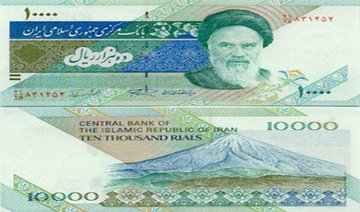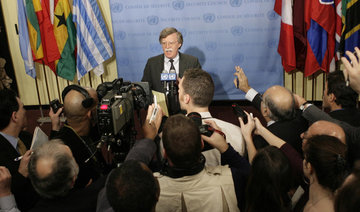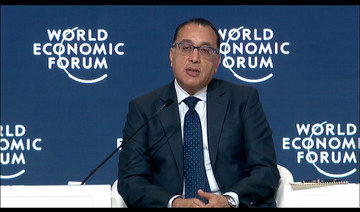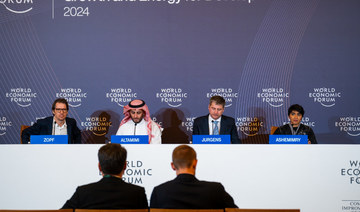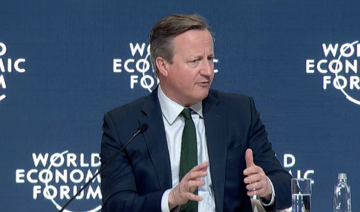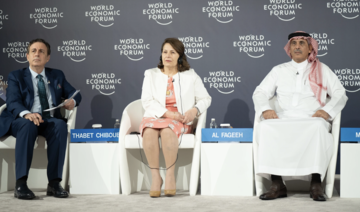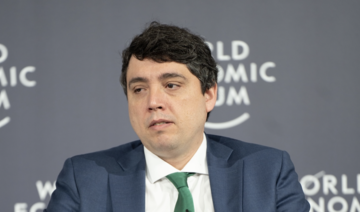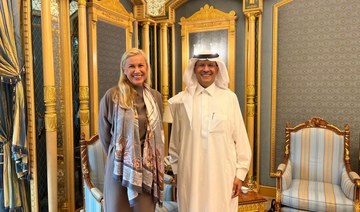TEHRAN: The Iranian rial fell to a record low on Monday, breaking through the 50,000-to-the-dollar mark for the first time as analysts blamed uncertainty from Washington.
The rial has lost around a quarter of its value in the past six months, hitting 50,860 against the US dollar, according to Financial Informing Network, a trusted Iranian website for open market currency rates.
The gap between that and the official rate, which stood at 37,686 on Monday, has continued to widen.
Iran’s government took drastic measures last month to stem the decline in the free market rate, arresting foreign exchange dealers, freezing speculators’ accounts and raising interest rates.
But on the streets of Tehran, long queues continued to gather outside foreign exchanges in the run-up to this month’s Nowruz New Year holiday.
“The issue is psychological rather than economic. There’s no reason to buy dollars except in the hope that you can sell them later at a higher rate,” said Esfandyar Batmanghelidj, founder of the Europe-Iran Forum, a business network.
He said Iranians were reacting to worrying news from the United States, where President Donald Trump this month appointed hard-line anti-Iran figures Mike Pompeo and John Bolton to senior posts in his administration.
Many analysts believe Trump will pull out of the 2015 nuclear deal with Iran when it next comes up for renewal in May, bringing back crippling sanctions.
“I see many people looking to invest in neighboring countries because this fear is spreading about the future of the JCPOA (nuclear deal),” said Navid Kalhor, a Tehran-based financial analyst.
Local officials have complained that Iranians are hoarding billions of dollars as local banks run short of cash.
“I have friends who go to banks and ask for 15 or 20 million rials ($300 or $400) and they’re told to come back in a week because they’re out of cash,” said Kalhor.
The devaluation poses a major problem for President Hassan Rouhani’s government, which had hoped to attract massive foreign investment in the wake of the nuclear deal.
Already facing huge obstacles from remaining, non-nuclear US sanctions, the collapsing currency will serve as another deterrent to potential investors, Batmanghelidj said.
“Even in an instance where an investor is willing to operate in Iran, the devaluation is very concerning. If you invest now and the currency falls even 15 percent, you have to discount that from your returns, and that’s very difficult to hedge against,” he said.
“This will be difficult for the government. There is very little they can do about the mentality of individuals.”
The government has resisted unifying the official and free-market rates of the rial because it would mean more expensive imports and therefore higher inflation.
But analysts say the gap has distorted trade and fueled corruption.
Perhaps the biggest challenge is that hoarding dollars has become a preferred way to store money amid economic uncertainty, especially after a housing boom stagnated after years of over-construction.
Iranian banks have tried to counter this by offering interest rates as high as 20 percent.
But this has only fueled wider problems in the economy by discouraging investors from putting their money into businesses.
“The situation in the economy right now is far from beautiful,” said Kalhor.
Iran currency hits record low, crashing through 50,000 mark
Iran currency hits record low, crashing through 50,000 mark
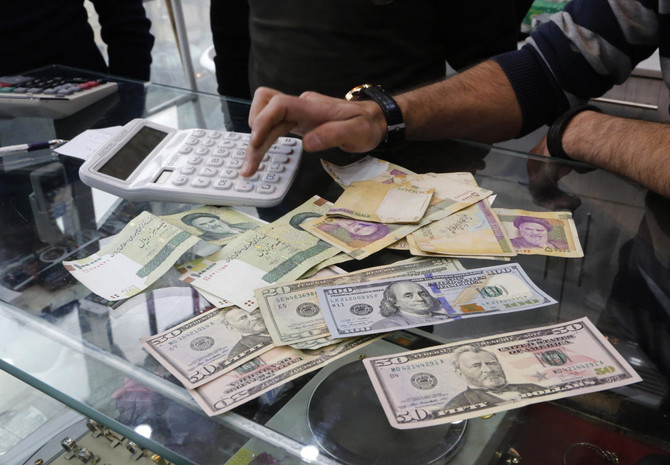
Global collaborations crucial to address global challenges, says Saudi official
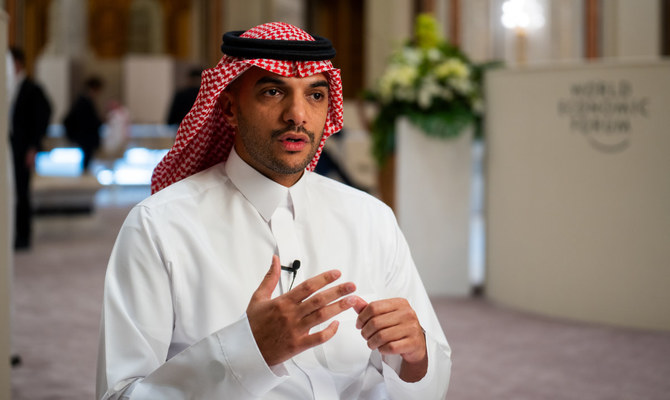
- Ammar Nagadi, vice minister of economy and planning, talks to Arab News on the sidelines of World Economic Forum Special Meeting in Riyadh
RIYADH: Global collaborations are a crucial element in efforts to tackle economic and social challenges, especially given the current state of the world, a leading Saudi official said.
In an interview with Arab News on the sidelines of the two-day World Economic Forum Special Meeting on Global Collaboration, Growth and Energy for Development, which concluded on Monday in Riyadh, the Kingdom’s vice minister of economy and planning, Ammar Nagadi, spoke about the important role such gatherings can play in advancing economic cooperation to address global challenges.
He believes the world is going through a “unique” time, with economic and social challenges worldwide and human development at a critical stage.
“Because of this, global collaboration and the world convening together becomes more and more important,” Nagadi said.
“We have seen that over the last few years Saudi Arabia is becoming a platform that brings together different people from different parts of the world to discuss challenges and to address these challenges” and the World Economic Forum special meeting is a continuation of that process, he added.
“We have more than 1,000 leaders today from different sectors (attending the meeting). We have heads of states, private sector and public sector leaders, and entrepreneurs from more than 70 countries across the globe.
“I think this diverse group, coming together to discuss and address global challenges is a unique opportunity and we are very happy to have it here in Riyadh today.”
Describing the economic landscape in the Kingdom, Nagadi said the Saudi economy is going through a very strong period of transformation that is reflected in the progress the country has made in terms of growth and diversification.
“Last year, Saudi Arabia’s non-oil activities grew by 4.4 per cent but I think the most important thing to realize is that non-oil activities, as a percentage of total gross domestic product, have reached, for the first time in history, 50 percent of the total GDP,” he added.
This represents a significant milestone that reaffirms the progress made in efforts to diversify the national economy, he added, which have created numerous benefits, including investment opportunities and improved job prospects for Saudis.
“If I take one example, you will see that unemployment last year in the last quarter has reached an all-time low of 7.7 per cent and we hope to see that momentum continuing,” Nagadi said.
He believes this momentum will also continue in terms of growth and diversification.
“We target to grow around 5 per cent for non-oil activities this year but we have seen recent forecasts by the IMF (International Monetary Fund) where they’re expecting Saudi Arabia to further grow in 2025 by around 6 per cent,” he added.
Saudi Arabia is also making progress toward achieving sustainability goals, which Nagadi said is another important topic.
“What we have today is Vision 2030, which is very ambitious, and sustainability is an integral part of that vision,” he added.
“We have economic goals, social goals, environmental goals. If I were just to take the environmental part of the sustainable development goals, you will see that Saudi has put in a lot of efforts as part of Vision 2030.”
The Saudi Green Initiative, announced in March 2021, is a great example of what the Kingdom is doing not only to drive economic growth but also protect the planet, Nagadi said.
“The aim is to achieve net-zero emissions by 2060, and the goals are to increase the renewable energy mix to 50 percent of the total energy mix and plant 10 billion trees by 2030 as well as protecting land and sea,” he said, adding that 50 million trees have already been planted.
Saudi-UK economic symphony hits high note with Vision 2030, Lord Mayor of City of London tells Arab News
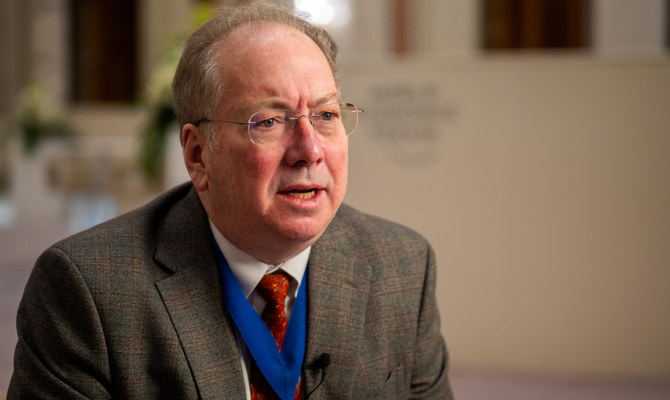
- Michael Mainelli: ‘With the amazing changes under Vision 2030, we’re anticipating yet more investment both ways’
RIYADH: Business and investment between Saudi Arabia and the UK are flourishing under the “amazing” Vision 2030 reform plan, with expectations for further collaborations on the horizon, the Lord Mayor of the City of London told Arab News in Riyadh.
Michael Mainelli said of the business and investment connections between Saudi Arabia and the City of London: “The Gulf is our fourth-largest trading partner with about £65 billion ($81.47 billion) in trade every year, and Saudi is the largest chunk of that to well over £17 billion, so trade is very good.”
Saudi investment in the City of London has always been “very, very strong, and British investment in Saudi has also been strong. I don’t think there’s anything other than growth, and with the amazing changes under Vision 2030, we’re anticipating yet more investment both ways,” he added.
“The great thing about Vision 2030 is that it’s almost like a pyramid, with the entire nation working together towards a whole series of goals.”
The UK is “the world’s premier professional financial services sector, so there will always be opportunities for us to collaborate with Saudi Arabia” in this field, Mainelli said. “I think less appreciated is our recognition of Saudi intellect.”
He said he is “trying to make connections” in Riyadh, adding that Saudi academia, science, technology and research “are growing very well.”
Mainelli outlined three main avenues of Saudi investment in the City of London: property development, operational businesses, and science and technology. He added that Saudis are also investing in areas such as media distribution and packaging.
“I’m looking forward to a tremendous amount of Saudi investment in science and technology, particularly in areas like hydrogen, where Saudi Arabia is very strong, as well as in desalination and biotech,” he said.
Emphasizing initiatives aimed at bolstering economic cooperation between Saudi Arabia and the UK, he said: “The British government is hosting a two-day conference here in Riyadh from May 14 to 15. We’re bringing over about 400 to 500 British firms to look at areas where they’re looking at technology.
“Equally, in June we have our Net Zero Delivery Summit, where Saudi Arabia will be present, and on June 24 the UK-Saudi infrastructure meeting, where we’ll discuss infrastructure projects both ways.”
Providing insight on how the UK can further strengthen economic relations with Saudi Arabia, especially after having left the EU, Mainelli said: “The Brexit vote was over eight years ago, and in the City of London we’ve grown from 525,000 workers to 615,000 workers — a net gain of 90,000.
“Also, assets under management globally have increased from just over 12 percent to about 15 percent of global assets. So the City of London has been doing very well post-Brexit.”
Mainelli highlighted the value of conferences such as the World Economic Forum in Riyadh, which he attended, as catalysts for business deals, often beginning with conversations between individuals.
“It’s great to have this event. It focuses very much on cooperation, particularly in the energy sphere, which is fundamental to economic growth,” he said.
“Britain is a petrostate in its own right, not as strong as Saudi Arabia. Both countries have to work on what’s their energy transition going to be in a net zero world.”
Besides geopolitical tensions, trade restrictions pose significant barriers to global collaboration, Mainelli said.
“These are present in both goods and services, particularly in professional services, and the way to address them … is through standards. These are ISO (International Organization for Standardization) standards, which I’m promoting for artificial intelligence and space sustainability, for example,” he added.
“These are mutual recognition standards for professionals working, so a Saudi accountant could work in Britain and vice versa, and similarly for lawyers etc.
“The third area concerns governance standards and how organizations are managed. So I believe probably the biggest thing to constantly work at is standards.”
Mainelli stressed the need to address geopolitical tensions, “but as a business community we’re not deeply involved in those negotiations, decisions or military actions, so it’s important for us to understand how we should be reacting to and how we can support peace through trade.”
Global ‘Center for Space Futures’ announced at World Economic Forum
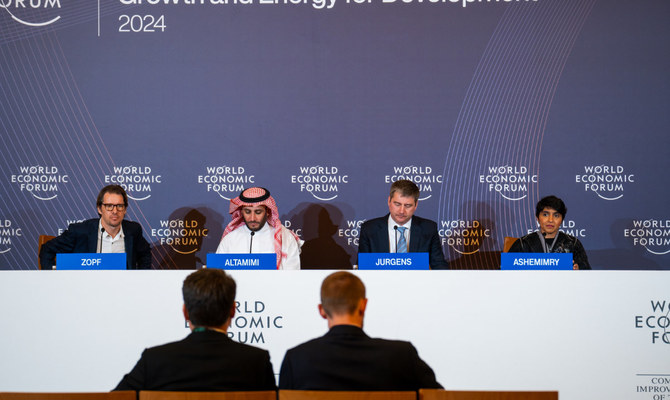
- The center aims to facilitate public-private discussions on space collaboration, incorporating best practices from the WEF and its communities into the global space sector
RIYADH: The World Economic Forum and the Saudi Space Agency signed an agreement to establish the Center for Space Futures, a Centre for the Fourth Industrial Revolution.
Hosted by the SSA, the center is expected to open later this year and will be the first in the C4IR network to focus exclusively on space. It will operate alongside the existing national center, C4IR Saudi Arabia, to advance Saudi Vision 2030.
Jeremy Jurgens, the WEF managing director, told Arab News: “Historically, many people assume that space is the exclusive domain of a few countries that have a fully integrated space technology stack. What we’ve seen over the last few years is that space is something that should be available to the whole globe.
“By launching the Center for Space Futures here in Saudi Arabia, we’re actually demonstrating that space is something for all humanity, and that we can actually unlock those benefits and use them anywhere and everywhere.”
The center aims to facilitate public-private discussions on space collaboration, incorporating best practices from the WEF and its communities into the global space sector, and generating contributions to accelerate space technologies.
Dr. Mohammed Al-Tamimi, CEO of the SSA, told Arab News: “This center is part of a global platform that will engage everyone to make sure that we’ll be activating public and private discussions, especially in this era.” As the world experiences a shift from a government-centered space sector to a private-centric sector, Al-Tamimi said that the center offers “great potential to collaborate and engage more with the private sector and government initiatives.”
The officials said they are committed to harnessing the vast opportunities of the space industry and creating a sustainable economy globally through best practices, governance, policies, innovation and valuable technologies to encourage further cross-sector engagement.
Mishaal Ashemimry, managing director of the Center for Space Futures, told Arab News: “Space generally has seen no boundaries when it comes to development, and you need the input of international countries with their expertise, their backgrounds, their achievements in space, to work together, whether it’s towards a mission or achieving governance policies … Space cannot move forward without international collaboration.”
The center will join 19 others that make up the C4IR network, a platform for multistakeholder collaboration, bringing together public and private sectors to maximize technological benefits to society while minimizing the risks.
The WEF launched the first C4IR in San Francisco in 2017, followed soon after by others in Japan and India. The network now includes the Centre for Trustworthy Technology, in Austin, the US Centre for Advanced Manufacturing, in Detroit, Germany’s Global Government Technology Centre, Norway’s HUB Ocean, and others in Rwanda, Saudi Arabia, Serbia, South Africa, India, Turkiye and the UAE.
Saudi Arabia likely to meet tourism targets ahead of 2030, says top official
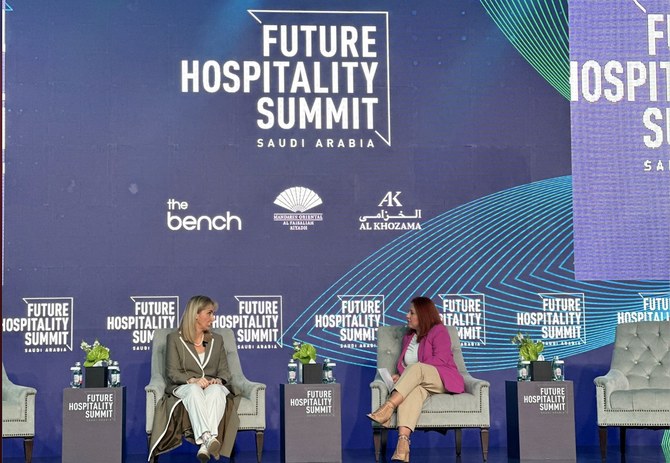
RIYADH: Based on Saudi Arabia’s extraordinary achievements in the tourism sector, the Kingdom is likely to achieve its targets ahead of 2030, said a top tourism official.
During a panel at the Future Hospitality Summit held in Riyadh, Gloria Manzo, chief special adviser at the Ministry of Tourism, likened Saudi Arabia’s approach toward the development of the sector to the private sector with clear goals with key performance indicators reviewed quarterly.
She added: “We have goals, we have quarterly meetings that review our KPIs quarterly. You better be on the plan and if not, you have to explain why, so most likely it will achieve those numbers, before 2030. Absolutely!.”
Manzo noted that increasing the target indicates that Saudi Arabia is progressing faster than expected, which reflects a positive momentum in achieving tourism goals.
She said for Saudi Arabia “the sky is the limit.” The development process in the Kingdom, she added, is supported by unprecedented levels of government investment.
“What the government is doing in this country, there’s no other example in the world. I have never seen something like this in my 30 years of career,” the official said.
She also highlighted challenges facing the tourism sector such as geopolitical issues and weather-related crises, which can disrupt operations.
The official identified the development of human resources for the sector as a challenge for which the government is taking several measures.
“We wish we could do that faster. The ministry is training Saudis abroad. We announced a (training) academy. We’re partnering with universities here. That is very important, but it will be wonderful if we can train them faster. The private sector is also helping us to train these Saudis,” she said.
Manzo also expressed optimism about more Saudi women joining the tourism industry.
The official said interestingly the Saudi government “moves faster than the private sector” unlike any other country in the world where the latter tends to act quicker. She said small and medium enterprises require more support to keep pace with the ongoing development in the sector.
“I would say the SMEs need more support, and of course, we wish we can support them so that they can accelerate in this transition,” Manzo added.
“We’re working with them. We have a plan and the ecosystem is very structured,” the tourism official said.
Saudi chemicals giant SABIC targeting net zero by 2050, CEO says
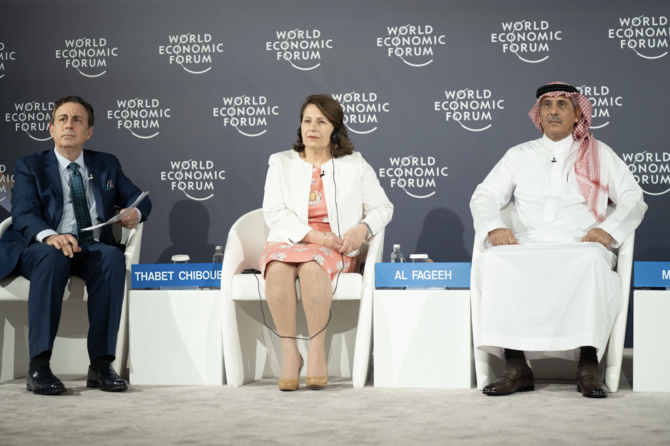
- SABIC aims to convert 1 million tons of waste into feedstock for the petrochemical industry by 2030, Al-Fageeh said
RIYADH: Saudi Arabia’s top chemicals company is turning to circular economy solutions to reach carbon neutrality by 2050 and advance the Kingdom’s net-zero agenda, its CEO has said.
Abdulrahman Al-Fageeh, CEO of the Saudi Basic Industries Corporation, was speaking at the “Demand for Energy ... Transforming Costs into Gains” panel during the special meeting of the World Economic Forum in Riyadh.
SABIC aims to convert 1 million tons of waste into feedstock for the petrochemical industry by 2030, he said.
The circular carbon economy has helped the chemicals sector expand its investment horizon since 2020, he added.
Al-Fageeh said that SABIC marked achievements in energy efficiency and reduced its carbon footprint at the end of 2023 by 12.74 percent. The company is targeting carbon neutrality by 2050.
SABIC has also adopted alternative energy from plastic waste, seeking to produce 1 million tons of sustainably sourced chemicals by 2030.
Energy efficiency
Al-Fageeh said that his company had started sustainability programs at an early stage, improved reliability, developed 90 initiatives and projects, and closed a number of sites due to ineffectiveness.
In 2023, SABIC had more than 200 patents, 40 percent of which related to sustainability in energy efficiency.


